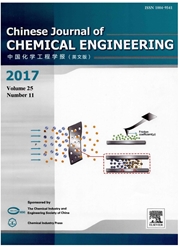

 中文摘要:
中文摘要:
<正>The effect of benzoyl peroxide (BPO) on polypropylene (PP) degradation in supercritical water was investigated with the aim of developing a process for recycling of waste plastics. A series of experiments with and without BPO were carried out at temperatures of 653 K and 673 K under pressure about 26 MPa for 30, 75 and 120 min respectively. Products were analyzed by an Ostward-type viscometer, gas chromatography and spectrometry (GC/MS) etc. The results indicated that mean molecular weight of the samples decreased greatly along with the time elapsing or with the temperature increasing, and PP was decomposed to aliphatic and cycloparaffinic hydrocarbons but a few benzenoid hydrocarbons. By comparing the experiments with and without BPO, it was made clear that BPO is an effective additive on PP degradation in supercritical water.
 英文摘要:
英文摘要:
The effect of benzoyl peroxide (BPO) on polypropylene (PP) degradation in supercritical water was investigated with the aim of developing a process for recycling of waste plastics. A series of experiments with and without BPO were carried out at temperatures of 653 K and 673 K under pressure about 26 MPa for 30, 75 and 120 min respectively. Products were analyzed by an Ostward-type viscometer, gas chromatography and spectrometry (GC/MS) etc. The results indicated that mean molecular weight of the samples decreased greatly along with the time elapsing or with the temperature increasing, and PP was decomposed to Miphatic and cycloparaftinic hydrocarbons but a few benzenoid hydrocarbons. By comparing the experiments with and without BPO, it was made clear that BPO is an effective additive on PP degradation in supercritical water.
 同期刊论文项目
同期刊论文项目
 同项目期刊论文
同项目期刊论文
 期刊信息
期刊信息
